With a rainbow sticker affixed to his campaign ballcap and another on his black polo shirt, Larry Hogan zigzagged from one side of the street to the other, shaking hands and posing for selfies at the Annapolis Pride Parade on Saturday afternoon.
The former governor, now a Republican candidate for the U.S. Senate, was marching in his first-ever Pride Month event. “How you doing? Happy Pride!” he said to obliging parade-watchers. Others quietly dodged Hogan and a few openly booed him.
“Get Republicans out of Pride!” one person shouted.
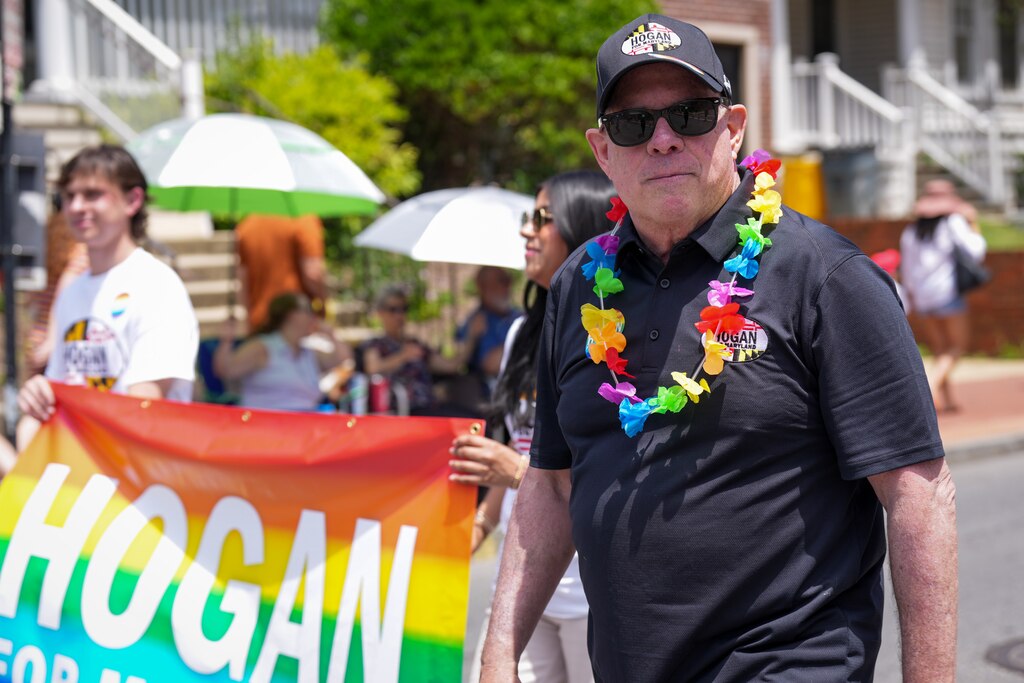
Hogan’s political rival, Democratic nominee Angela Alsobrooks, didn’t make the parade. But a throng of Democratic officials and activists wore her bright green T-shirts and waved her signs as they made their way down the parade route. Some spectators chanted “Angela! Angela!” or “All in for Alsobrooks” as Hogan’s crew walked by.
Alsobrooks, who marched in Annapolis Pride last year, plans to attend several other Pride events around the state this month.
Over the last several years, Pride parades and festivals have become must-attend events for politicians — particularly Democrats — who want to show their support for the community.
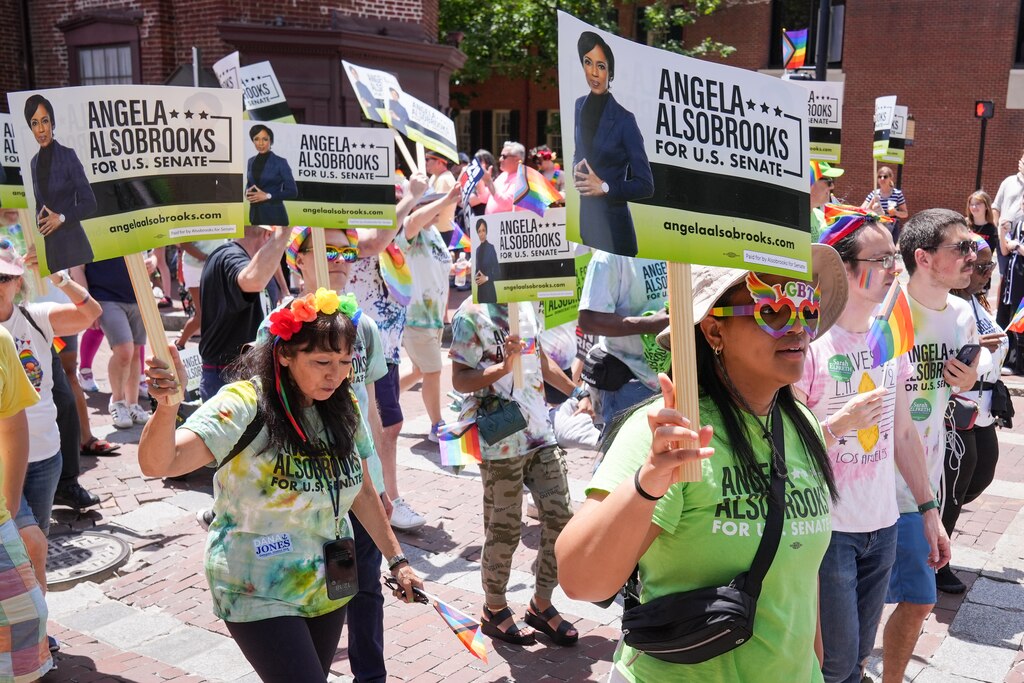
While the LGBTQ population is small — with estimates varying, but generally less than 10% — LGBTQ voters are savvy, engaged and can make a difference in a close race, according to Andrew Flores, an assistant professor in American University’s School of Public Affairs.
“They end up being a very important constituency at the margins. Very close races can be won or lost based on LGBTQ voters,” said Flores, who studies politics and policies that affect LGBTQ populations.
Maryland has a competitive U.S. Senate race for the first time in ages, and both candidates are reaching out to as many different types of voters as possible. And during Pride Month, that means queer voters.
The candidates will need to convince LGBTQ Marylanders that they have both a record and a vision to support the community, Flores said. It’s not just parades that matter — policy matters even more.
“LGBTQ voters tend to be quite attentive voters. They are looking at not just words and symbols, but actions — what are the behaviors that people are taking that actually further the quality of life for LGBTQ people,” Flores said.
LGBTQ+ voters and their allies are concerned about maintaining their rights, particularly with a conservative majority on the U.S. Supreme Court and the prospect of Republican control of Congress and the White House. When the Supreme Court overturned the Roe v. Wade case that legalized abortion care, Justice Clarence Thomas signaled an intention to overturn the Obergefell v. Hodges case that allowed for same-sex marriages nationwide.
Hogan’s record
Hogan faces challenges in wooing LGBTQ+ voters. Typically 75%-85% of LGBTQ+ voters are Democrats, Flores said, putting the former governor at a disadvantage. Hogan has been casting himself as an independent voice, but he is from the same party that, in other parts of the country, has taken aim at diverse curricula, transgender youth and even drag performers.
“He’s trying to set himself apart from the party, but at the end of the day, there is still an ‘R’ next to his name,” Flores said.
During his eight years as governor, Hogan largely stayed on the sidelines when it comes to gay rights.
Hogan didn’t march in Pride parades or light up the governor’s mansion in rainbow colors.
He didn’t sponsor any legislation aimed at expanding rights for LGBTQ+ Marylanders or helping them with health care or fighting discrimination.
When those types of bills did pass the Democrat-dominated legislature and ended up on the governor’s desk, Hogan typically let them become law without his signature.
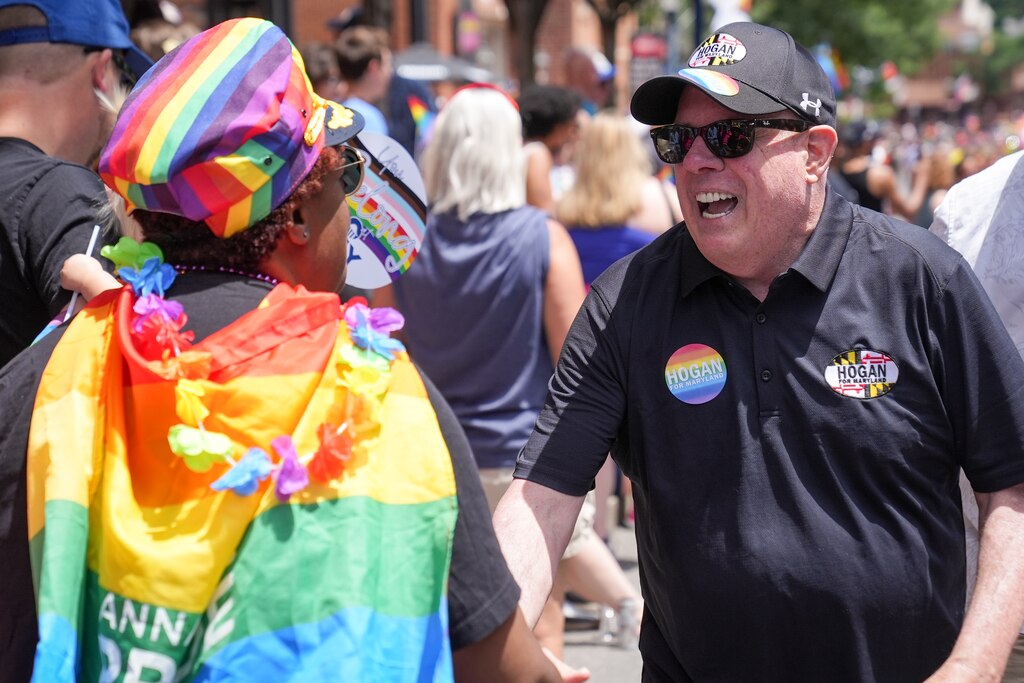
The LGBTQ+-friendly bills that went into law without Hogan’s signature or support included measures making it easier for transgender Marylanders to change their birth certificates, drivers licenses and marriage certificates; creating a state Commission on LGBTQ+ Affairs; and expanding the definition of a hate crime to include gender identity.
Hogan brushed off a question about why he didn’t put pen to paper on the bills, saying legally there’s no difference between a bill that he signs and one that goes into law without his signature. “It has the same effect,” Hogan said.
Asked whether he’s concerned that his record may signal he’s not fully supportive of the community, Hogan responded: “We’re just going to come out here and try to talk to the people and community and meet them. Hopefully they’ll give us some consideration. We’re not going to be with anybody 100% of the time on every issue.”
Advocates question whether Hogan can take credit for the work of lawmakers.
“Larry Hogan, for eight years, essentially acted as if LGBTQ people did not exist,” said Del. Kris Fair, chair of the General Assembly’s LGBTQ+ Caucus.
Fair was elected in 2022, just as Hogan left office, but has paid close attention for years as an activist, legislative staffer and director of a community center in Frederick.
The strides made for the LGBTQ community were done “despite his administration,” said Fair, a Democrat. One that particularly frustrates Fair is a law passed in 2021 that eliminates the so-called “panic defense” that a criminal defendant could use in court to limit their culpability based on learning of a victim’s sexual or gender identity. It went into effect without Hogan’s signature.
“It’s genuinely shocking to people like me that he couldn’t even take a basic position on very simple legislation. That would have spoke volumes from his office,” Fair said.
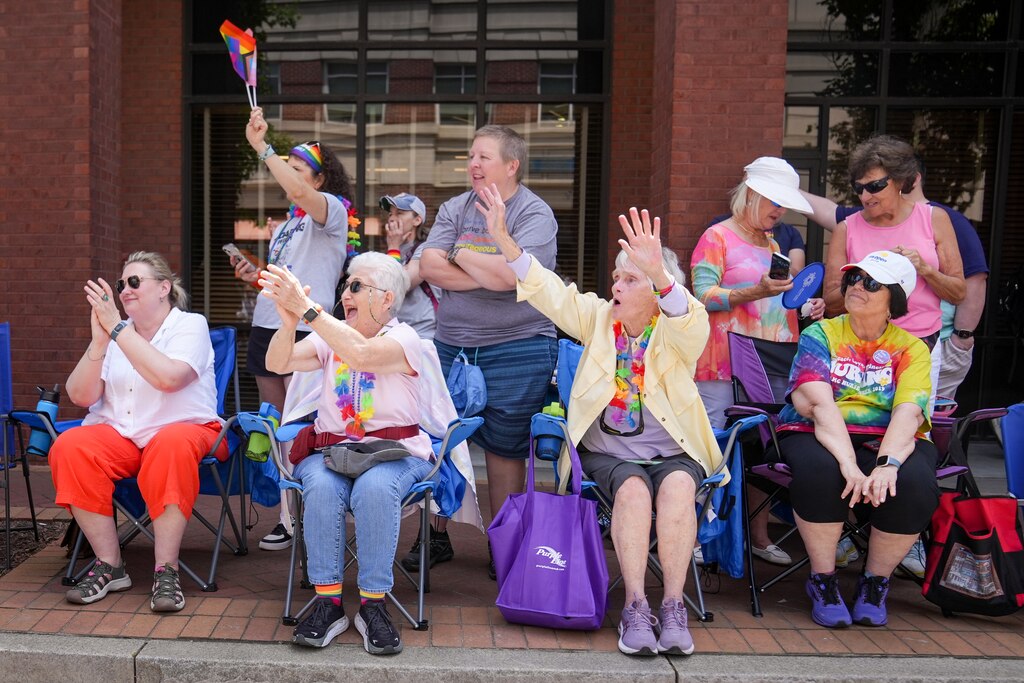
Hogan has been endorsed by the Log Cabin Republicans, a group that says it is “the nation’s largest Republican organization dedicated to representing LGBT conservatives and allies.” Neither the national office nor the local chapter responded to interview requests.
Hogan, in a brief interview, did not offer any specific policies or legislation he’d support for the LGBTQ+ community if elected to the Senate. “We’ll have plenty of time to talk about a lot of those issues. ... We’re going to listen to everyone and try to make reasonable decisions that are fair and equitable,” he said.
Alsobrooks’ record
Alsobrooks, meanwhile, has publicly championed LGBTQ+ rights, and ramped up her actions in the past year. In her official capacity as county executive for Prince George’s County, she launched a series of social media videos for Pride Month on Saturday.
“I am so proud to support the LGBTQ+ community and will be a tireless champion for them in the United States Senate,” she said in a statement. “Full stop.”
After previously issuing Pride Month proclamations, Alsobrooks appointed the first LGBTQ liaison for the Prince George’s County government in June 2023. That month also marked the first time she had the rainbow pride flag hoisted above the county administration building.
That month, Alsobrooks also wrapped a rainbow feather boa around her neck and walked in the Annapolis Pride parade; she also donned rainbow sunglasses for a county police department Pride walk at National Harbor. Later in the fall, Alsobrooks participated in a county government LGBTQIA+ meet and greet.
Alsobrooks, who is serving her second term as county executive, announced her candidacy for Senate in May 2023.
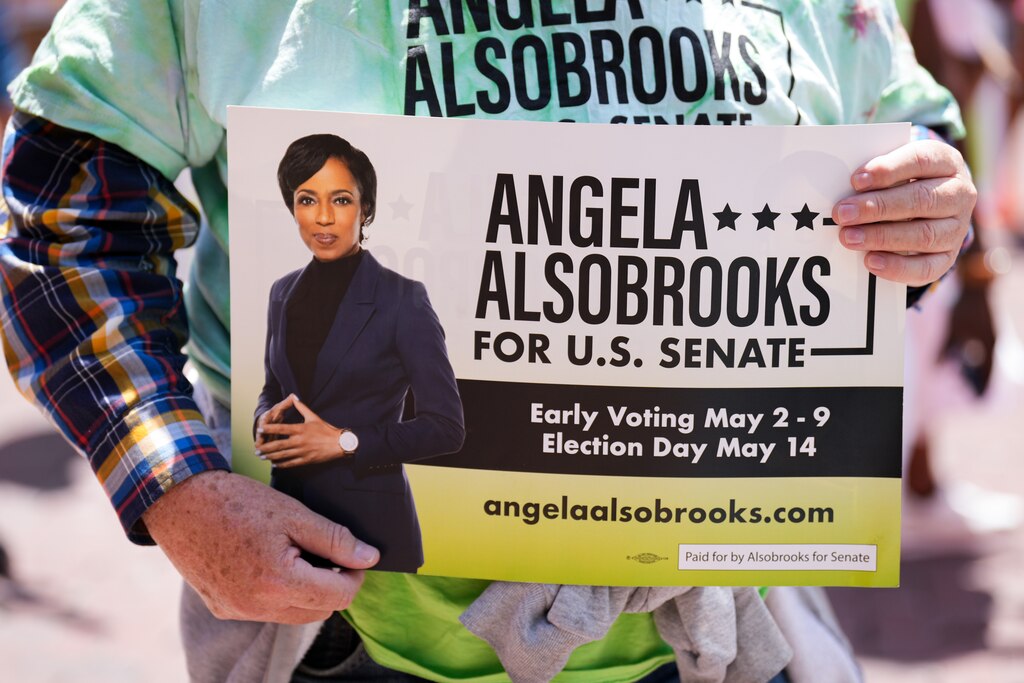
Her campaign website makes a broad promise to “stand up for the rights of LGBTQ+ Americans.” The website promises Alsobrooks will “strongly oppose” anti-trans legislation put forward by Republicans.
“We must speak out against ant-trans hate and violence, from bullying in our schools, to violent hate-based crimes, to discriminatory legislation,” the website reads.
Alsobrooks’ actions haven’t been without criticism, however.
Krystal Oriadha, the first openly LGBTQ+ person to serve on the Prince George’s County Council, passed a resolution to fly the pride flag at the county administration building. But she said the Alsobrooks administration balked at having a public ceremony for it, which was frustrating.
“They did it in the middle of the night, instead of the ceremony that was prescribed in the resolution,” said Oriadha, a Democrat. “I was disappointed that it was done that way, but I think the fact that it was done was still a step forward.”
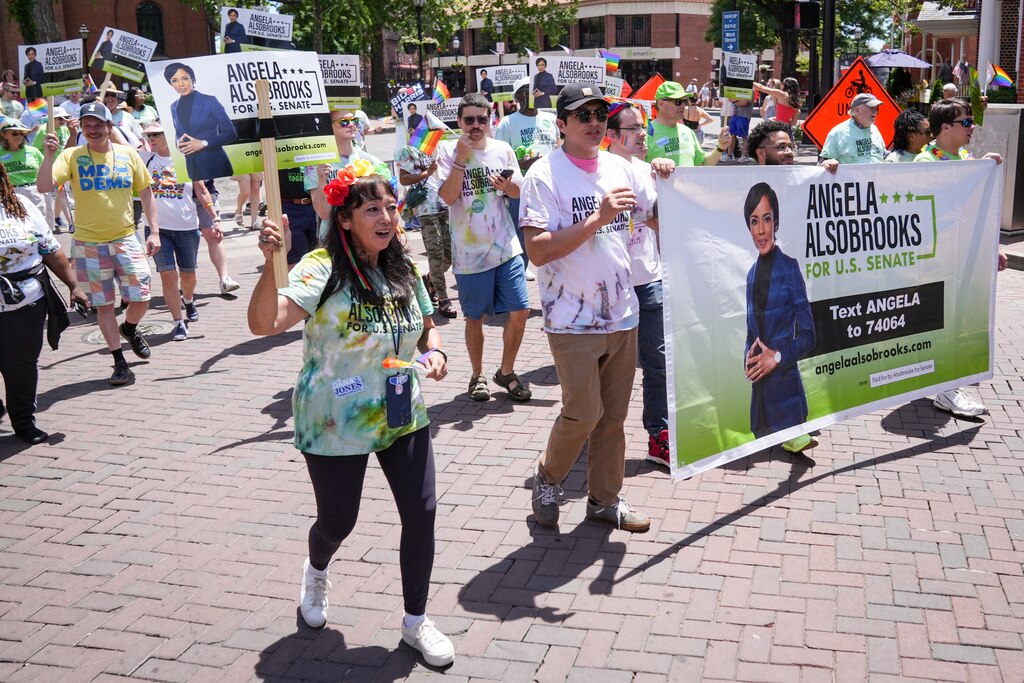
Despite her frustrations, Oriada praised the Alsobrooks administration for expanding health services for people with HIV and AIDS, a key concern of the LGBTQ+ community. Oriadha didn’t support Alsobrooks in the Democratic primary election, but said there’s “no debate” that she’ll back Alsobrooks in the fall.
Democrats may disagree over the details of how to best support LGBTQ+ Marylanders, but Republicans barely acknowledge the needs of the community at all, Oriadha said.
“The Democratic Party is way ahead of the Republican Party in that way. … They don’t even believe in my existence,” she said.




Comments
Welcome to The Banner's subscriber-only commenting community. Please review our community guidelines.